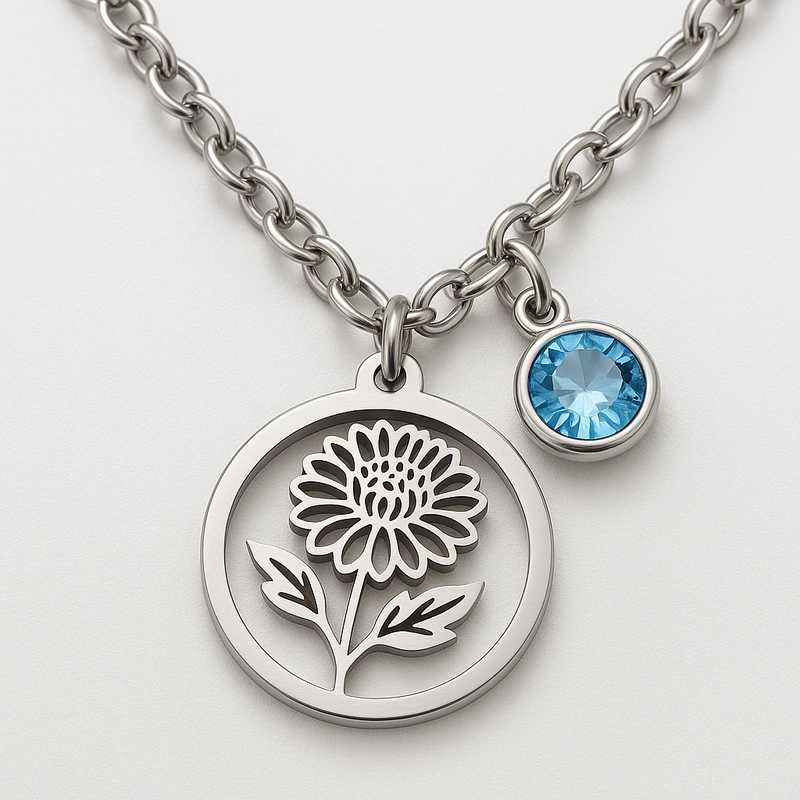Engineering Elegance: Stainless Steel Jewelry Redefined

Explore Advanced Materials and Sustainable Technologies Shaping OEM/ODM Charm Necklaces
In the evolving landscape of jewelry manufacturing, stainless steel has emerged as a material of choice for OEM/ODM charm necklaces, particularly those featuring custom birth month flowers and birthstones. This shift is driven by advancements in materials science and manufacturing technologies that offer enhanced durability, aesthetic appeal, and sustainability.
Material Excellence: 304 vs. 316L Stainless Steel
Understanding the differences between 304 and 316L stainless steel is crucial for manufacturers aiming to produce high-quality charm necklaces.
304 Stainless Steel
- Composition: Contains approximately 18% chromium and 8% nickel.
- Corrosion Resistance: Offers good resistance to corrosion in a variety of environments but is less resistant to chlorides.
- Applications: Suitable for general-purpose jewelry, especially where cost-effectiveness is a priority.
316L Stainless Steel
- Composition: Includes 16-18% chromium, 10-14% nickel, and 2-3% molybdenum.
- Corrosion Resistance: Superior resistance to corrosion, particularly against chlorides and other industrial solvents.
- Applications: Ideal for high-end jewelry pieces exposed to harsh environments, such as marine or industrial settings.
The addition of molybdenum in 316L enhances its corrosion resistance, making it the preferred choice for jewelry that demands longevity and exposure to challenging conditions.
Advanced Manufacturing Technologies
Modern manufacturing techniques have revolutionized the production of stainless steel jewelry, enabling intricate designs and efficient production processes.
Laser Cutting
Laser cutting technology allows for precise and intricate designs to be cut into stainless steel sheets. This method ensures high accuracy and repeatability, essential for mass production of charm necklaces with detailed patterns.
Hydraulic Forming
Hydraulic forming utilizes high-pressure fluid to shape metal sheets into desired forms. This process is particularly effective for creating three-dimensional floral designs, providing depth and realism to birth month flower charms.
Corrosion Patterning
Controlled corrosion techniques are employed to create unique textures and patterns on stainless steel surfaces. This method adds a distinctive aesthetic to jewelry pieces, enhancing their visual appeal and uniqueness.
Sustainable Production Practices
Environmental considerations are increasingly influencing manufacturing decisions. Implementing sustainable practices not only reduces environmental impact but also appeals to eco-conscious consumers.
Waste Recycling
Recycling metal scraps generated during the manufacturing process minimizes waste and reduces the need for raw material extraction. This practice contributes to a circular economy and sustainable resource management.
Green Electroplating
Traditional electroplating processes often involve hazardous chemicals. Green electroplating techniques utilize environmentally friendly solutions, reducing toxic waste and improving workplace safety.
Adopting these sustainable practices aligns with global environmental goals and enhances the brand image of manufacturers committed to responsible production.
Conclusion: Embracing Innovation and Sustainability
The integration of advanced materials like 316L stainless steel and cutting-edge manufacturing technologies such as laser cutting and hydraulic forming has redefined the standards of stainless steel jewelry production. Coupled with sustainable practices like waste recycling and green electroplating, manufacturers can produce high-quality, durable, and environmentally friendly charm necklaces.
For OEM/ODM customers seeking to innovate and lead in the jewelry market, embracing these advancements is not just an option but a necessity. Collaborate with manufacturers who prioritize material excellence, technological innovation, and sustainability to create jewelry pieces that resonate with modern consumers.
Ready to redefine elegance in stainless steel jewelry? Partner with us to explore bespoke solutions tailored to your brand’s vision and values.
